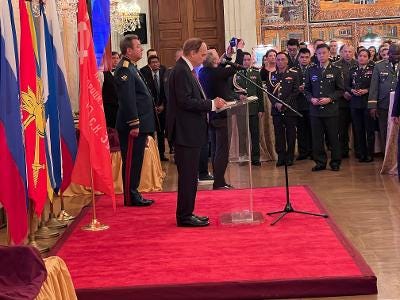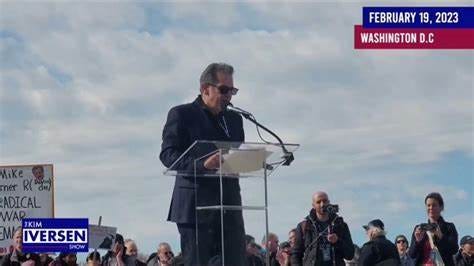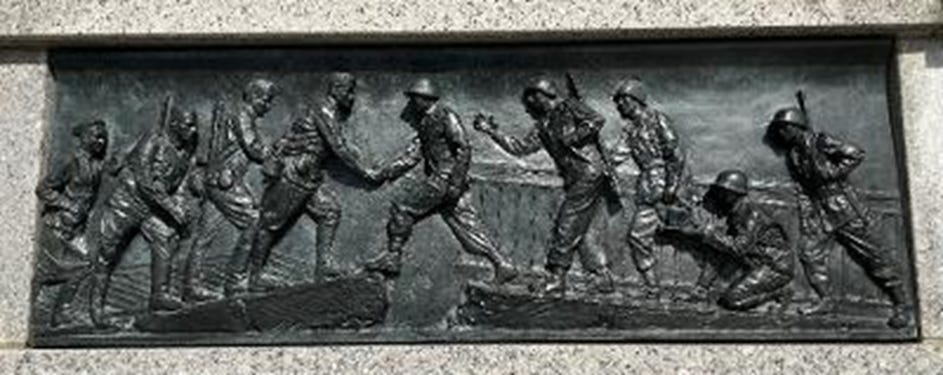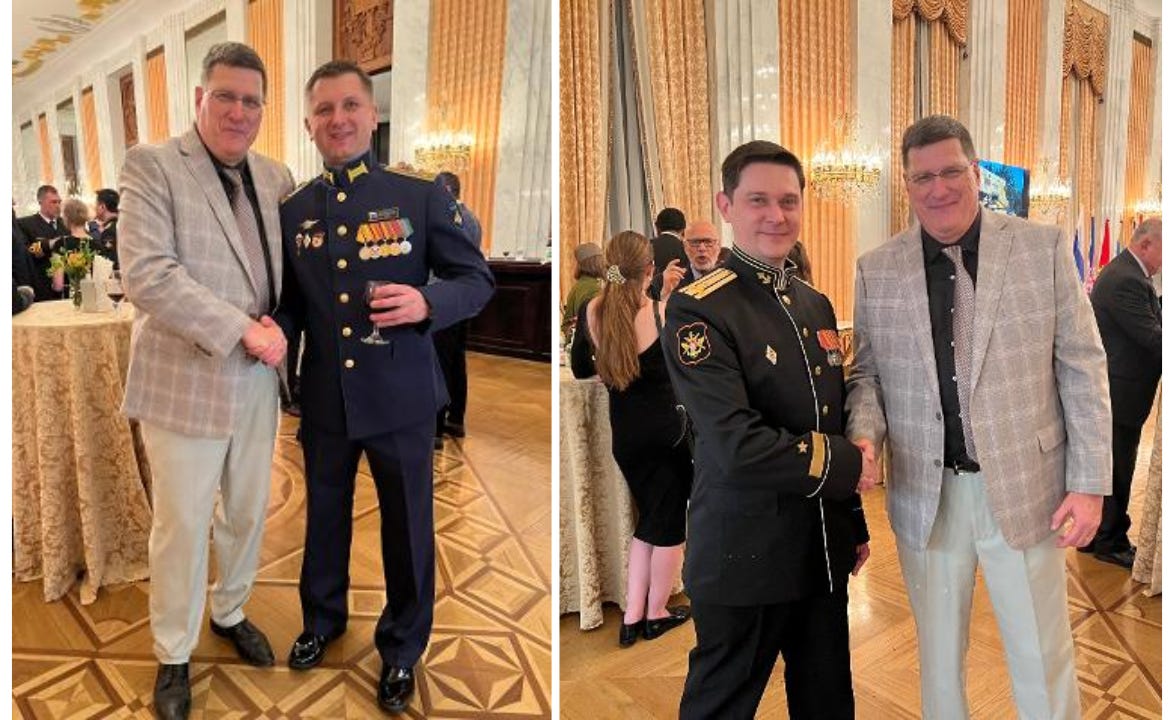
Russian Ambassador Anatoly Antonov delivers his congratulatory address on the occasion of Defender of the Fatherland Day, February 23, 2023, at the Russian Embassy in Washington, DC. Major General Evgeny Bobkin, the Russian Defense Attache, stands at attention on the stage behind the Ambassador.
A week ago this Sunday thousands of people gathered together at the steps of the Lincoln Memorial to collectively “rage against the war machine.” History will judge if this event measured up to what its organizers had envisioned, and if the words spoken there will continue to resonate going forward.
From my own personal perspective, it doesn’t matter if the rally is seen as a success, or the speeches delivered there deemed memorable. And while I applaud the organizers (yes, even the Libertarian Party) for making this event possible, as far as I am concerned their role is done. They got us to the starting line and helped fire the starter pistol.
But now it is up to those running the race to finish the race. And, based upon conversations I had with many of the participants afterwards, there is collective agreement that not only is this a race that should be run, but more importantly, must be won.
The interesting thing about the “Rage Against the War Machine” rally isn’t so much that the organizers managed to bring together such a politically diverse group of speakers, but rather that the speakers spoke a common language that cut across political lines. For those who participated, this process was cathartic. For those who opted out, you are weaker for it.

The race to get arms control back on the US policy objective has a finish line—the November 2024 elections. If Americans can elect enough like-minded people—representatives, senators, and the president—to office who share this same vision, and agree on its absolute priority, then there remains hope that a new arms control treaty can be negotiated and ratified to forestall a potentially humanity-ending nuclear apocalypse.
But my race is more than just a 21-month marathon. It is an obstacle course, with numerous challenges that must be overcome in addition to the daunting task of staying the course. One of the greatest challenges I will face on this race is that of Russophobia. In what I’ve termed “the best speech I never gave” (my abortive presentation penned for the occasion of the “Rage Against the War Machine” rally), I spoke of the “disease of Russophobia,” warned about the “hate-filled rhetoric of Russophobia,” and cautioned against “systemic Russophobia” as the greatest impediment to our collective ability to “open our minds and our hearts to accept the Russian people as fellow human beings deserving of the same compassion and consideration as our fellow Americans — as all humankind…allow the love we have for ourselves to manifest itself into love and respect for our fellow man…work with our fellow human beings in Russia to create communities of compassion that, when united, make a world filled with nuclear weapons undesirable, and policies built on the principles of mutually beneficial arms control second nature.”
Scott Ritter will discuss this article and answer audienc questions on Episode 49 of Ask the Inspector.
While these goals and objectives may appear to reflect common sense, the fact is, not a single possible course of action is possible today because of Russophobia. It is, indeed, a disease, and fighting the infection is very much an uphill battle.
The key to solving the many problems facing the United States and Russia in the field of arms control is old fashioned diplomacy, where American representatives sit down with their Russian counterparts and engage in constructive—difficult, yes, but always constructive—dialogue that helps find points of commonality, identify points of disagreement, and helps chart a path that leads to mutually beneficial compromise.
Today, however, no such diplomacy is taking place. In the Russian Embassy to the United States sits two men who, under ideal circumstances, would take the lead in helping craft any future arms control agreement with the United States, Ambassador Anatoly Antonov and Major General Evgeny Bobkin. Ambassador Antonov was the chief Russian negotiator for the New START treaty, and is seeped in the very issues that would have to be addressed going forward. General Bobkin is an officer of the Strategic Rocket Forces, with experience in both silo-based and road mobile intercontinental ballistic missiles. His first-hand knowledge of Russian systems and nuclear posture would be invaluable in helping both the US and Russia define the parameters of any new treaty, especially one that sought to incorporate new Russian systems that have been deployed since New START entered force back in 2010.
On February 23, 2023, Russia celebrated Defender of the Fatherland Day, an annual celebration of the Russian armed forces. It is a big deal, and the Russian Embassy held a reception worthy of the occasion. I was fortunate enough to receive an invitation, and I jumped at the opportunity to attend.
I’m glad I did.
Earlier today, I tweeted out a short video clip of me toasting the occasion of Defender of the Fatherland Day with a pair of Russian colonels.
Most people commenting about the tweet liked it; some did not. Adrian Karatnycky, a Senior Fellow at the Atlantic Council and co-Director of the “Ukrainian Jewish Encounter,” responded, “Scott Ritter raises a toast to Russia’s war against Ukraine in the company of the Army that is perpetrating this genocide.”
“Where were you, Mr. Atlantic Council?” I replied. “For someone whose ostensible raison d’être is the furtherance of fact-based analysis, one would think you’d be at the tip of the spear when it comes to garnering important insights into complex issues. And yet…absent, on all counts.”
And that, of course, is the whole point. Back when I served as an inspector with the On-Site Inspection Agency, implementing the Intermediate-Range Nuclear Forces Treaty, there were numerous occasions where I would have the occasion to meet socially with Soviet diplomats and military personnel. On every occasion, these meetings would result in my writing up an account of the meeting, highlighting points I thought could be of interest from both a political and military standpoint. The Soviets I met would undoubtedly be doing the same. This was, and is, the “nuts and bolts” of the so-called “cocktail circuit,” a process of interaction designed to break down barriers and provide the respective parties the opportunity to get to know one another, and the nations they represented, a little bit better.
In short, Diplomacy 101.
There were no representatives of the United States in attendance that evening (I was there as a private citizen.) And as a result, they missed the opportunity to evaluate the tenor and tone of Ambassador Antonov’s address. Yes, one can read the words from the Russian Embassy press release the next day. But to hear the Ambassador in person changes everything.
“On April 25, 1945, there was a famous meeting of Soviet and American troops on the Elbe River,” Antonov said, solemnly. “We remember that time when our countries stood shoulder to shoulder to save humanity from Nazism. Russian and American veterans cherish the memory of their comradeship in arms. It is our hope that the spirit of the Elbe will not just remain a symbol in relations, but will actually help us improve the situation in the world.”
And unless you were there, you could not see how his words resonated on the faces and in the eyes of the Russian officers present, men who wished nothing more for there to be better relations with the United States, but who were resigned to accomplishing their mission if there were not.

The evening was full of such observable—and as such, learnable—moments, all missed because of elitist posturing which held that by isolating Russia, America and the collective west is weakening Russia.
Anyone in attendance at the Russian Embassy that night could tell you that while Russia was saddened by the snub, they were neither isolated nor weakened.
They were determined.
But the best part of the evening for me was the human-to-human contact, among people who treated me as a friend, a feeling I gladly reciprocated.
No propaganda.
No Russophobia.
Just people being people—humans being human.
And it gave an old Marine the chance to meet fellow professional soldiers in the best venue possible—a social gathering, where we could discuss issues calmly, without recrimination or rancor.
Because the alternative is to meet them on the field of battle.
Given that option, I’ll drink to peace anytime. And I’d be honored to do it in the company of men and women like those whom I had the privilege of meeting that evening.







joseba says:
https://twitter.com/RealScottRitter/status/1629184735829262336
joseba says:
https://twitter.com/RealScottRitter/status/1629185463146713088